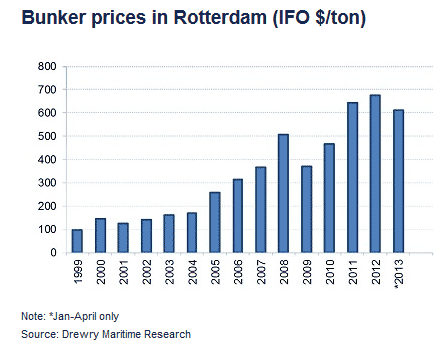From SCDigest's On-Target e-Magazine
- June 4, 2013 -
Global Supply Chain News: No Fast End in Sight for Slow Steaming
Rates have Sunk Again even as Bunker Fuel Stays High; Record Number of TEU to be Scrapped, but the Megaships Keep Coming
SCDigest Editorial Staff
Slow steaming, the technique originally pioneered by Maersk Lines a few years ago to reduce operating costs in the face of a rate environment that leads to prices often below costs, is not likely to go away anytime soon.
The controversial practice, in which ships sail at approximately two-thirds of their normal speeds, saves increasingly expensive bunker fuel, at the "cost" to the shipper obviously of adding days to the sailing schedule.
SCDigest Says: |
 |
Drewry says that that the end of April, there were still another 31 ships over 10,000 TEU due for delivery yet in 2013.
|
|
What Do You Say?
|
|
|
|
Some on the carrier side of the ledger consider it "giving shippers the level of service they are paying for," as rock bottom rates are being seen once again in Asia to Europe and Asia to North American lanes in 2013, after a decent price environment for the carriers for much of 2012.
Bunker fuel is a substantial cost to ocean carriers, and unlike diesel fuel prices, which peaked in the summer of 2008 and have bounced around at mostly lower levels ever since, soared past 2008 highs in 2011 and have remained elevated ever since.
So far in 2013, bunker fuel has been priced a little over $600 per ton, versus an average of about $500 per ton in 2008 - a 20% increase. (See chart below).
And of course, the carriers continue to add TEU to their fleets even as industry capacity far exceeds global demand for container shipments, putting significant downward pressure on rates and leading to carrier losses on East to West routes.
Volumes are also soft, with the heady days of container unit growth well above global GDP having ended a few years ago. Though Maersk Lines was able to generate a modest profit in Q1, for example, it did so even though its container volumes slipped 4%.
As a result of all this, the analysts at Drewry say that it "will force carriers to resort to more slow steaming." This is in part because Drewry finds in general that the carriers are receiving very modest rate premiums for service at normal speeds, although it says "market feedback is mixed on this."
Bunker Fuel Continues to Stay at High Levels

(Global Supply Chain Article Continued Below)
|